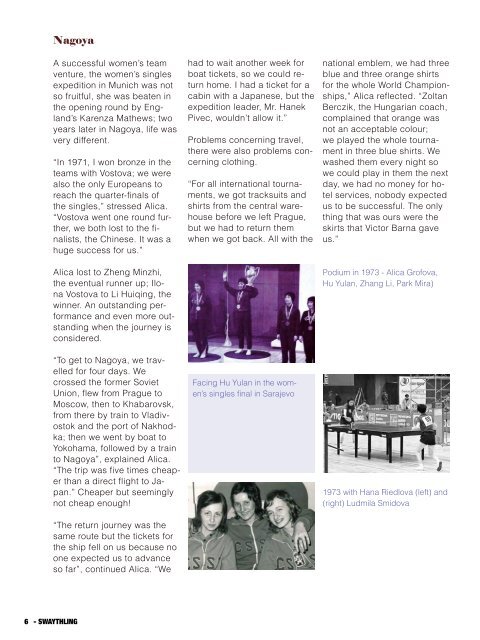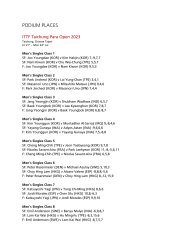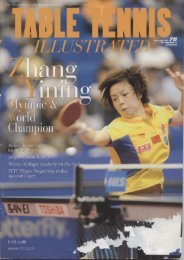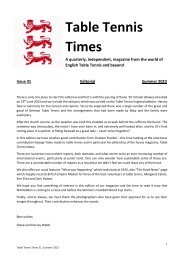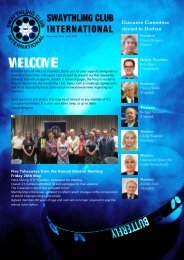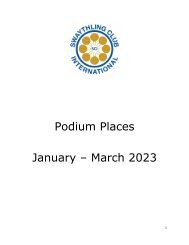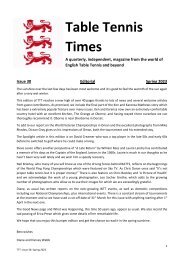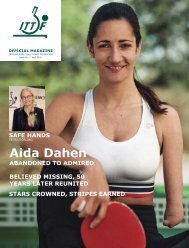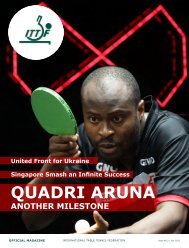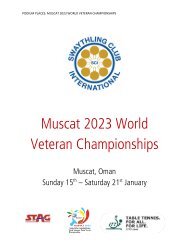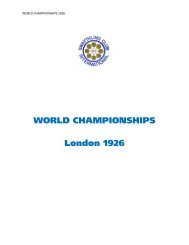Swaythling_Mag_112-1 (2023_04_26)
Create successful ePaper yourself
Turn your PDF publications into a flip-book with our unique Google optimized e-Paper software.
Nagoya<br />
Sarajevo<br />
A successful women’s team<br />
venture, the women’s singles<br />
expedition in Munich was not<br />
so fruitful, she was beaten in<br />
the opening round by England’s<br />
Karenza Mathews; two<br />
years later in Nagoya, life was<br />
very different.<br />
“In 1971, I won bronze in the<br />
teams with Vostova; we were<br />
also the only Europeans to<br />
reach the quarter-finals of<br />
the singles,” stressed Alica.<br />
“Vostova went one round further,<br />
we both lost to the finalists,<br />
the Chinese. It was a<br />
huge success for us.”<br />
Alica lost to Zheng Minzhi,<br />
the eventual runner up; Ilona<br />
Vostova to Li Huiqing, the<br />
winner. An outstanding performance<br />
and even more outstanding<br />
when the journey is<br />
considered.<br />
“To get to Nagoya, we travelled<br />
for four days. We<br />
crossed the former Soviet<br />
Union, flew from Prague to<br />
Moscow, then to Khabarovsk,<br />
from there by train to Vladivostok<br />
and the port of Nakhodka;<br />
then we went by boat to<br />
Yokohama, followed by a train<br />
to Nagoya”, explained Alica.<br />
“The trip was five times cheaper<br />
than a direct flight to Japan.”<br />
Cheaper but seemingly<br />
not cheap enough!<br />
“The return journey was the<br />
same route but the tickets for<br />
the ship fell on us because no<br />
one expected us to advance<br />
so far”, continued Alica. “We<br />
had to wait another week for<br />
boat tickets, so we could return<br />
home. I had a ticket for a<br />
cabin with a Japanese, but the<br />
expedition leader, Mr. Hanek<br />
Pivec, wouldn’t allow it.”<br />
Problems concerning travel,<br />
there were also problems concerning<br />
clothing.<br />
“For all international tournaments,<br />
we got tracksuits and<br />
shirts from the central warehouse<br />
before we left Prague,<br />
but we had to return them<br />
when we got back. All with the<br />
Facing Hu Yulan in the women’s<br />
singles final in Sarajevo<br />
national emblem, we had three<br />
blue and three orange shirts<br />
for the whole World Championships,”<br />
Alica reflected. “Zoltan<br />
Berczik, the Hungarian coach,<br />
complained that orange was<br />
not an acceptable colour;<br />
we played the whole tournament<br />
in three blue shirts. We<br />
washed them every night so<br />
we could play in them the next<br />
day, we had no money for hotel<br />
services, nobody expected<br />
us to be successful. The only<br />
thing that was ours were the<br />
skirts that Victor Barna gave<br />
us.”<br />
Podium in 1973 - Alica Grofova,<br />
Hu Yulan, Zhang Li, Park Mira)<br />
1973 with Hana Riedlova (left) and<br />
(right) Ludmila Smidova<br />
A remarkable success in Nagoya,<br />
life was even better in<br />
1973 in Sarajevo, mixed doubles<br />
bronze partnering Josef<br />
Dvoracek was followed by<br />
women’s singles silver.<br />
Success but it nearly did not<br />
happen, the preparation was<br />
not ideal, just as in 1966 when<br />
encouraged to be more positive<br />
by Ivan Andreadis, in a<br />
rather different manner, Alica<br />
made a major change to her<br />
playing style.<br />
“Originally, I thought I would<br />
not go to Sarajevo. I was unwell;<br />
I was not allowed to<br />
play sport for four months. I<br />
started training only in December<br />
1972 and I was not<br />
in the Czechoslovak team”,<br />
explained Alica. “At that time,<br />
the national team coach, Vaclav<br />
Ostravicky, literally forced<br />
me to change the rubber on<br />
my backhand from Sriver to<br />
anti-top spin. I played an offensive<br />
game with a defensive<br />
rubber; previously I had used<br />
Sriver on both sides, the blade<br />
being Swedish, given to me by<br />
Hans Alser.”<br />
At the time it was the combination<br />
also used by two national<br />
team members, Miloslava Polack<br />
and Dana Dubinov.<br />
“After a month, I won the<br />
Czechoslovak Open. I beat<br />
Zoja Rudnova for the first time<br />
and in the final, Ilona Vostova.<br />
The next month I won the<br />
World Student Championships<br />
in Hanover, again defeating<br />
Rudnova, this time in the final;<br />
thus, I was named for the<br />
World Championships in Sarajevo”,<br />
said Alica. “I didn’t<br />
perform my best in the team<br />
event; I injured my knee during<br />
the free day. I played the<br />
whole individual competition,<br />
including the finals, with a<br />
knee pad and a bandage.”<br />
Most certainly the knee injury<br />
did not hamper her performance<br />
in the women’s singles<br />
event. A straight games win<br />
against Yugoslavia’s Eva Jeler<br />
in the early rounds, underlined<br />
she was in good form.<br />
“It was so hard to play against<br />
Alica; she played with anti-spin<br />
on the backhand, remember<br />
in those days both<br />
sides of the racket were the<br />
same colour, reflected Eva<br />
Jeler. “At the time new surfaces<br />
were emerging. In 1973 I<br />
had no experience of playing<br />
against such surfaces. I think<br />
the first time I came against<br />
anything resembling her kind<br />
of play was in 1971 in Nagoya.<br />
I’d never practised against<br />
such a style. Later, I discovered<br />
how to play against<br />
someone of that style.”<br />
A comprehensive win, against<br />
the lady who became one of<br />
the most respected coaches<br />
on planet earth, was followed<br />
by a much closer encounter in<br />
opposition to Hungary’s Beatrix<br />
Kishazi, a contest in which<br />
Alica recovered from a two<br />
games to nil deficit to secure<br />
victory.<br />
“Against Beatrix I was passive,<br />
I wasn’t playing very<br />
effectively; I lost the first two<br />
games and was down 9-15 in<br />
the third, it looked like a quick<br />
end. I managed to play some<br />
good points and that probably<br />
encouraged me,» recalled<br />
Alica. “However, I had no idea<br />
that I could still win the match.<br />
It was the only occasion in my<br />
life when I was able to turn<br />
a match in such a way and<br />
against a defender! It was literally<br />
a miracle.”<br />
Hard earned success against<br />
Beatrix Kishazi; in the next<br />
round, the quarter-finals, Alica<br />
beat the Soviet Union’s Elmira<br />
Antonian, before overcoming<br />
Korea Republic’s Park Mirae to<br />
reach the final where China’s<br />
Hu Yulan ended dreams.<br />
“After the match against Kishazi,<br />
I played really well;<br />
unfortunately, except for the<br />
final”, smiled Alica. “The huge<br />
tension and excellent tactical<br />
game of my opponent Hu<br />
Yulan did not allow me to repeat<br />
the good performances<br />
from previous matches.”<br />
Reaching the final was a momentous<br />
achievement, Alica<br />
had raised her game to a new<br />
level. On the February 1973<br />
World Rankings issued prior to<br />
the World Championships, the<br />
name of Alica Grofova did not<br />
appear amongst the 30 listed<br />
names; Hu Yulan occupied<br />
top spot. Following the tournament,<br />
Hu Yulan retained first<br />
place, Alica entered at number<br />
three.<br />
6 - SWAYTHLING<br />
SWAYTHLING - 7


